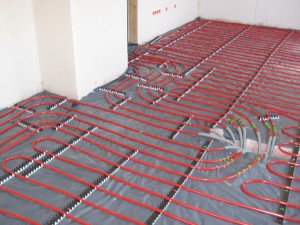
Hydronic is the most efficient form of radiant floor heating, but does it have any drawbacks? Check out this complete pro and con list and find out for yourself.
Radiant floor heating (RFH) is a system where the floor itself is heated and serves as the heat source for your home. There are two kinds of RFH: electric and hydronic. Hydronic is by far the more efficient, and has been getting a great deal of interest for that reason. Even so, many homeowners aren’t sure which is the best way to go. So is hydronic worth it? Here are the complete pros and cons:
Pros
- Extremely efficient. Electric RFH may feel just as nice as hydronic, but hydronic is by far the cheaper one to run. Electric heating is not efficient especially over large areas. If you simply wanted a heated floor in one room, like a bathroom, then electric might be fine; but if you want to heat your house you’ll come out ahead by going with a hydronic RFH system.
- Long lasting. There are few home utilities that last as long as a hydronic RFH heating system. This is partly because of how they’re designed and partly because they’re so efficient, which in itself puts less wear and tear on the system. A good hydronic RFH system can last 40 years or longer.
- Interfaces with tankless water heating. One of the best features of hydronic RFH is that is can interface with a tankless water heater system. After all, both devices essentially heat water while it’s in the pipes and circulate it through the house. Since tankless water heating is itself a money saver, combining the two systems means even lower energy bills than using just one or the other.
Cons
- Works best in new construction. Bear in mind that installing hydronic RFH means laying a series of tubes down underneath the flooring. This is easy to do with new construction, but it can be harder to do in an existing home because of the added expense of tearing up existing floors. However, hydronic RFH can be a good choice if you’re remodeling and will have the floor up anyway.
- Higher up-front cost. There is no question that the up front cost of hydronic RFH is higher than that of a traditional furnace system. However, the energy savings will offset this over time, particularly if combined with a tankless water heater.
Are you considering hydronic radiant floor heating? What are the biggest factors affecting your decision?
